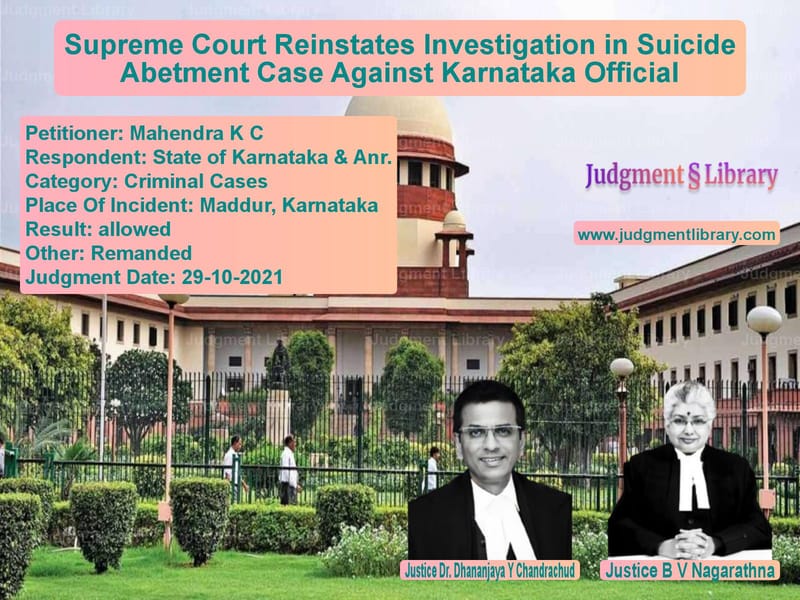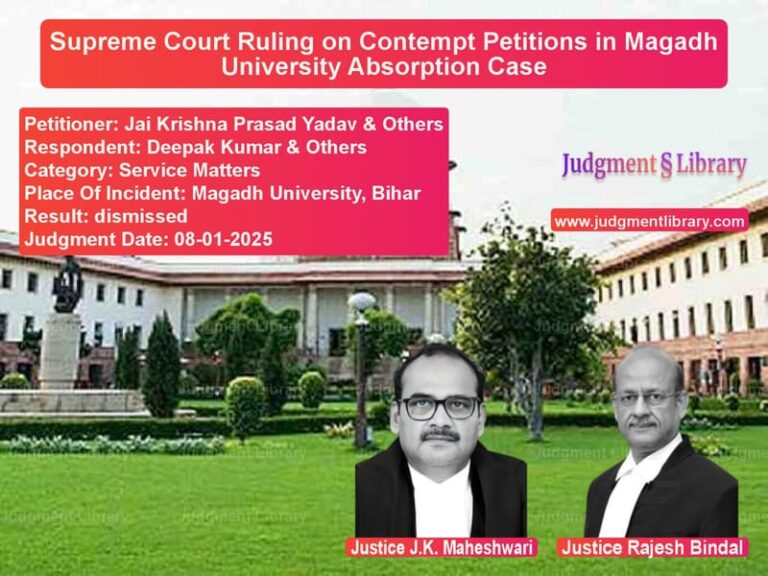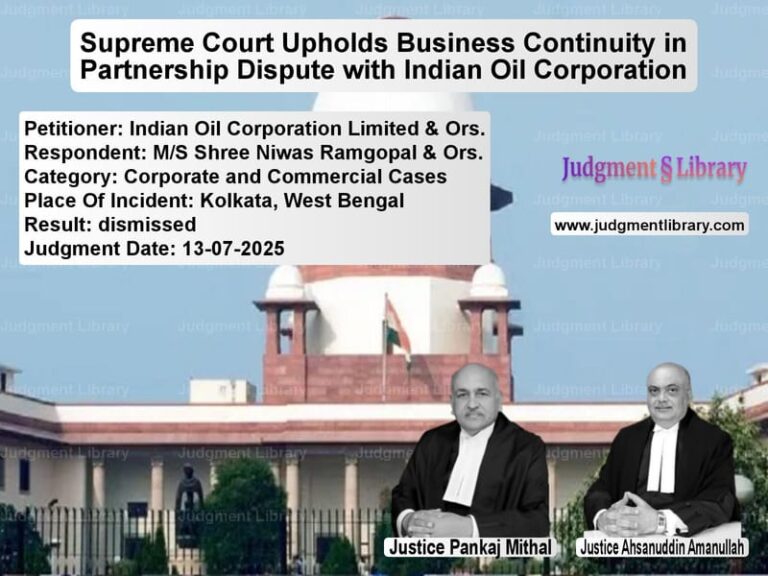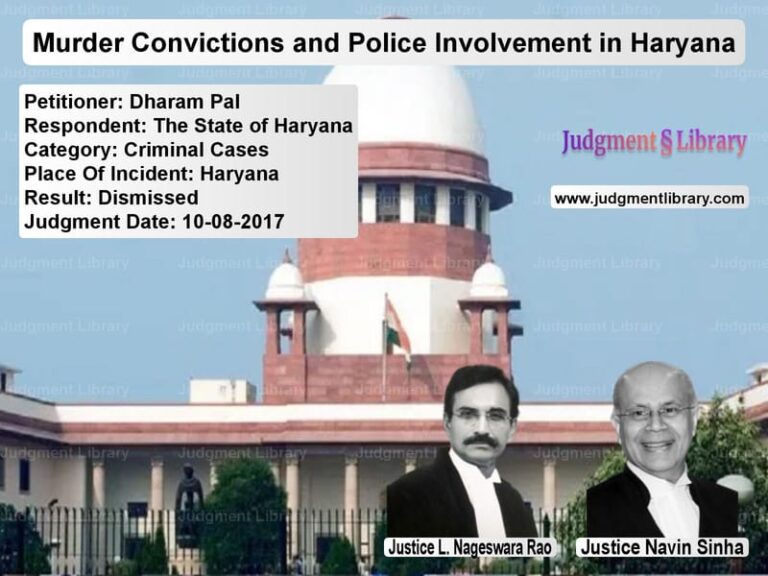Supreme Court Reinstates Investigation in Suicide Abetment Case Against Karnataka Official
The Supreme Court of India, in a significant judgment, reinstated the investigation in a case involving the alleged abetment of suicide by a Karnataka government official. The case, Mahendra K C vs. State of Karnataka & Anr., examined whether the quashing of the First Information Report (FIR) by the Karnataka High Court was justified. The Supreme Court ruled that the High Court overstepped its jurisdiction under Section 482 of the Criminal Procedure Code (CrPC) and reinstated the criminal proceedings.
Background of the Case
The case arose from the suicide of a driver employed by a Special Land Acquisition Officer (SLAO) in Karnataka. The deceased allegedly left behind a detailed suicide note implicating his employer, stating that he was coerced into facilitating financial transactions amounting to over ₹100 crores in black money conversion. The note further alleged that he was being harassed, threatened, and deprived of his salary, ultimately leading him to take his life.
The deceased’s brother lodged an FIR on December 6, 2016, at the Maddur Police Station, Karnataka, under Section 306 (abetment of suicide) of the Indian Penal Code (IPC). The police registered Crime No. 565/2016 and initiated an investigation. However, the accused filed a petition before the Karnataka High Court, seeking to quash the FIR.
Read also: https://judgmentlibrary.com/supreme-court-grants-bail-in-uapa-case-a-detailed-legal-analysis/
High Court’s Decision to Quash FIR
The Karnataka High Court quashed the FIR and the ongoing proceedings, ruling that:
- The suicide note, though detailed, did not provide enough direct evidence of threats or coercion.
- No independent material corroborated the allegations in the suicide note.
- It was improbable that the accused, a government official, would be involved in large-scale financial misconduct.
- The deceased had visited his home and attended a marriage before his death, which suggested that he was not under severe distress.
The complainant and the State of Karnataka appealed against this order before the Supreme Court.
Petitioners’ Arguments
The complainant and the State of Karnataka argued that:
- The High Court overstepped its jurisdiction under Section 482 CrPC by evaluating evidence instead of merely determining whether the allegations warranted an investigation.
- The suicide note explicitly mentioned threats and financial exploitation by the accused.
- The investigation was stalled, preventing the police from collecting corroborative evidence.
- The accused’s position as a government official could have influenced the quashing of the case.
Respondent’s Arguments
The accused argued that:
- There was no direct evidence linking him to the suicide.
- The suicide note was unreliable and contained exaggerated allegations.
- His role as a government officer did not imply wrongdoing.
Supreme Court’s Analysis
1. Scope of Section 482 CrPC
The Supreme Court held that the High Court failed to apply the correct legal test under Section 482 of CrPC. It ruled:
“The High Court has transgressed the well-settled limitations on the exercise of powers under Section 482 CrPC and has encroached into a territory reserved for a criminal trial.”
2. Relevance of the Suicide Note
The Court rejected the High Court’s view that the suicide note was unreliable, stating:
“The suicide note provides a detailed account of the accused’s illegal financial transactions and threats made against the deceased. These allegations warrant a thorough investigation.”
3. Investigation Cannot Be Halted Prematurely
The Supreme Court emphasized that the police had not yet gathered independent evidence due to the High Court’s stay on the investigation:
“It is inappropriate to quash an FIR when the investigation is incomplete. The proper course is to allow the investigating agency to gather evidence and then evaluate its sufficiency.”
Judgment and Conclusion
The Supreme Court set aside the High Court’s order, allowing the investigation to proceed. The key takeaways from the ruling include:
- The High Court erred in quashing the FIR at the preliminary stage.
- A suicide note containing detailed allegations must be investigated before drawing conclusions.
- The role of public officials in financial misconduct cases requires scrutiny, not summary dismissal.
- The accused’s arguments should be tested during trial, not at the FIR stage.
The ruling underscores the need for judicial restraint while exercising inherent powers under Section 482 CrPC and ensures that allegations of serious financial crimes linked to suicide are not dismissed without due process.
Judges: The judgment was delivered by Dr. Dhananjaya Y Chandrachud and B V Nagarathna.
Petition Result: Allowed
Petitioner Name: Mahendra K C.Respondent Name: State of Karnataka & Anr..Judgment By: Justice Dr. Dhananjaya Y Chandrachud, Justice B V Nagarathna.Place Of Incident: Maddur, Karnataka.Judgment Date: 29-10-2021.
Don’t miss out on the full details! Download the complete judgment in PDF format below and gain valuable insights instantly!
Download Judgment: mahendra-k-c-vs-state-of-karnataka-&-supreme-court-of-india-judgment-dated-29-10-2021.pdf
Directly Download Judgment: Directly download this Judgment
See all petitions in Suicide Cases
See all petitions in Fraud and Forgery
See all petitions in Extortion and Blackmail
See all petitions in Judgment by Dhananjaya Y Chandrachud
See all petitions in Judgment by B.V. Nagarathna
See all petitions in allowed
See all petitions in Remanded
See all petitions in supreme court of India judgments October 2021
See all petitions in 2021 judgments
See all posts in Criminal Cases Category
See all allowed petitions in Criminal Cases Category
See all Dismissed petitions in Criminal Cases Category
See all partially allowed petitions in Criminal Cases Category







